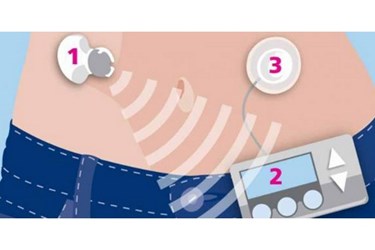Artificial Pancreas Team Achieves Important Milestone

A diabetic woman in Norfolk, England, has successfully carried and naturally delivered a baby while having her insulin regulated with a closed loop artificial pancreas system. Researchers from the University of Cambridge say that this success marks a major milestone in treating diabetes during pregnancy.
Researchers across the globe are working to develop and perfect artificial pancreas, or closed loop, systems that can monitor glucose levels around the clock and automatically administer a calculated dose of insulin through a pump as needed. A team from the Metabolic Research Laboratories (MRL) at the University of Cambridge is currently running a study to test the efficacy of these systems when used by pregnant patients.
“Treating diabetes in pregnancy can be particularly challenging because hormone levels are constantly changing and blood sugars can be difficult to predict,” explained Zoe Stewart, a Gates Cambridge Scholar and Clinical Research Fellow in a University of Cambridge press release.
According to the CDC, pregnant mothers with diabetes are at increased risk of preeclampsia, hypoglycemia, miscarriage, and stillbirth. Children born to diabetic mothers are more likely to develop birth defects of the brain, heart, or spine. Some babies might be born overlarge, which can cause complications for the mother as well as the child, and doctors in these cases are likely to consider a cesarean section.
To date, researchers say the only babies born to mothers using artificial pancreas systems were cesarean, but last week Catriona Finlayson-Wilkins became the first woman participating in the study to deliver her baby naturally.
The American Diabetes Association estimates that 29.1 million Americans are living with diabetes, and there are approximately 1.7 million new cases diagnosed each year.
The CDC reports that as many as 9.2% of pregnant women will develop gestational diabetes during their pregnancies.
According to the press release, results from the ongoing National Institute for Health Research’s Closed Loop in Pregnancy study are expected later this year, and if proven positive, researchers say that the artificial pancreas would offer a new approach to managing diabetic women through pregnancies.
Helen Murphy, senior research associate at the MRL, added, “The artificial pancreas is an exciting new technology that may help us to treat diabetes in pregnancy and create a group of healthier mothers and babies.”
Image credit: Diabetes UK
